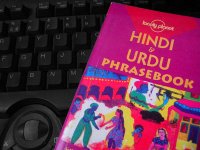
The PC had seemingly conked off, the only sign of life it showed was through incessant long beeps. After some speculation we (my roomie and me) interpreted it as an indication of undetected RAM. But multiple reinserting of the RAM bought forth no results. The beeps continued. Frustrated, we gave up. I screwed the cover back and feared for the cost. Then suddenly, without any intervention on our part, the blessed thing sprung back to life. Thank whosoever. But now I forgot what I wanted to write about. Anyway, I’ll save that for a later date (in case I recall).
I usually enjoy reading travel guides, especially about the places I know relatively well. It provides a different perspective of the places we reside in. This is a sequel to that. Lonely Planet’s Hindi and Urdu Phrasebook (another Daryaganj acquisition. Rs. 10 only) has some little gems. Sample these:
MOVIES
India produces more films than any other country, which suggests watching movies is a popular pastime. A successful film is also described as ‘very powerful’ while an unpopular film is often described as ‘putrid and rotten.’
a successful and very powerful film
bahut zabardast
dhasu pikcharan unpopular, ‘putrid and rotten film
sari gali filmDID YOU KNOW …
Particularly miserly people are sometimes referred to as:
kanjus makkhi chus
which literally means ‘miser, fly sucker!’ This means that a person is so miserly that if a fly were to fall into their tea, they would suck the tea from it before tossing it away!
SACRED COWS
The term ‘sacred cow’ (an institution, idea, person unreasonably held to be above questioning and criticism) comes from the respect cows receive by Hindus in India. It is not uncommon to see them meandering aimlessly through busy intersections and city streets. However, shopkeepers are not adverse to giving them a sharp whack if they take advantage of their elevated status and audaciously try to consume produce without paying for it.
WALLAH
The extremely useful adjectival suffix -vala is freely used in Hindi and Urdu and has come into English as ‘wallah,’ In fact there is hardly any word that may not be followed by -vala. It can be roughly translated as ‘one who does…’ or ‘the one which is…’
So bloggers are simply blogwallahs.


i’m happy to know that ur pc is also insane as mine.
Enlightening post! 🙂
nice post. 🙂
i have watched only one Hindi MOvie so far. It was Kalho Nahoo (im not sure of the spelling). They said it was a “successful and very powerful film”. But it seemed good based on what I witnessed (despite the fact that i didnt understand anything they said – no subtitles)very interesting post!
I think blogwallah is very cool. I shall immediately commence using it and who knows one day it might make it to the OED Indian English section!